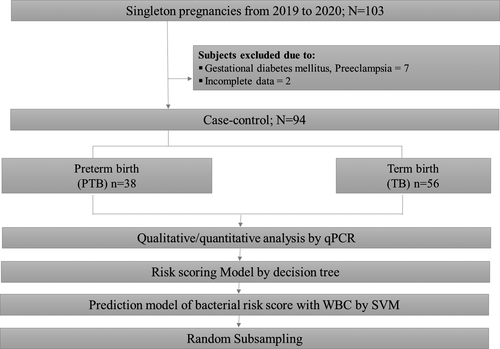김영주 (Young Ju Kim) 교수님의 연구 Prediction of preterm birth based on machine learning using bacterial risk score in cervicovaginal fluid가 American Journal of Reproductive Immunology에 출판되었습니다. 축하드립니다!
Journal DOI: https://doi.org/10.1111/aji.13435
Abstract
Problem
Preterm birth (PTB) is a major cause of increased morbidity and mortality in newborns. The main cause of spontaneous PTB (sPTB) is the activation of an inflammatory response as a result of ascending genital tract infection. Despite various studies on the effects of the vaginal microbiome on PTB, a practical method for its clinical application has yet to be developed.
Method of study
In this case-control study, 94 Korean pregnant women with PTB (n = 38) and term birth (TB; n = 56) were enrolled. Their cervicovaginal fluid (CVF) was sampled, and a total of 10 bacteria were analyzed using multiplex quantitative real-time PCR (qPCR). The PTB and TB groups were compared, and a PTB prediction model was created using bacterial risk scores using machine learning techniques (decision tree and support vector machine). The predictive performance of the model was validated using random subsampling.
Results
Bacterial risk scoring model showed significant differences (P < 0.001). The PTB risk was low when the Lactobacillus iners ratio was 0.812 or more. In groups with a ratio under 0.812, moderate and high risk was classified as a U. parvum ratio of 4.6 × 10–3. The sensitivity and specificity of the PTB prediction model using bacteria risk score were 71% and 59%, respectively, and 77% and 67%, respectively, when white blood cell (WBC) data were included.
Conclusion
Using machine learning, the bacterial risk score in CVF can be used to predict PTB.


